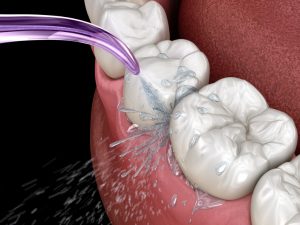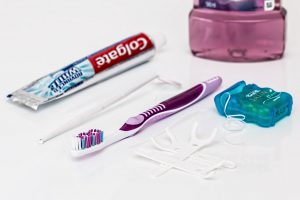A recent national survey found that the number 1 way to attract people is with a beautiful smile. But having a healthy mouth is about more than flashing your pearly whites to impress others. Current research is drawing connections between oral health issues and serious health problems, such as cardiovascular disease, diabetes, and even some cancers. And despite being told about the importance of oral health for most of their lives, only 85% of women and 66% of men over the age of 18 brush their teeth twice a day. In honor of National Smile Week (August 10-16), we’ve rounded up reminders of things to avoid, healthy habits to embrace, and tools you need to to keep your whole mouth feeling fresh and healthy!
Things to Avoid

Let’s go back to the basics. Here are things that we know are bad for our teeth and that we should avoid:
- Coffee and tea: Not only does drinking coffee and tea stain your teeth, but drinking these acidic beverages can also damage the protective layer of tooth enamel, causing greater risk for tooth sensitivity. If you must indulge, be sure to brush your teeth after your morning cup of Joe.
- Soda and sweets: This one might seem obvious, but limiting soda and sweets does wonders for oral health, as the sugary compounds in these treats feed plaque bacteria and cause it to multiply. Soda also has acidic qualities similar to coffee.
- Smoking: Smoking stains your teeth, damages the surface of your tongue, and puts you at a great risk for developing throat, gum, and lung cancers.
- Trendy teeth whiteners: Despite the many claims by manufacturers that teeth whiteners are safe, the American Dental Association cautions that most whitening agents can cause erosion to protective enamels, putting you at risk for sensitivity and damage. If you must whiten, consult with your dentist about your personal risk profile and safer options.
Build Healthier Habits
The best defense is a good offense, so make sure you’re taking good care of your teeth with these habits:
- Brush, floss, mouthwash: These three steps should be a part of your everyday routine! Brush at least twice a day with a fluoride toothpaste to rebuild and protect tooth enamel. Flossing every day might seem like a chore, especially if flossing is painful or causes bleeding, but it’s important for gum and tooth health – plus, the more you floss the stronger your gums get, which reduces the discomfort. Finally, dentists recommend mouthwash to get to those hard-to-brush places and to remineralize your mouth.
- Water and crunchy vegetables: Staying well-hydrated is key to a healthy mouth. Dry mouth increases the risk of plaque and bacteria growth, resulting in cavities and thrush. Crunchy vegetables help strengthen your teeth, and chewing them helps scrape off plaque in between brushings.
- Visit your dentist: Some people only visit their dentist when they have a problem, but that is the problem! Routine visits to the dentists are a preventative measure, so visit them every six months for a deep cleaning. Some health insurance plans offer basic dental care, so check with your provider to see if you’re covered.
Tools of the Trade
Once you’ve made healthy habits a part of your routine, step your game up with these additional oral health tools:
- Electric Toothbrush: While the American Dental Association consensus is that manual toothbrushes get the job done, some people might find electric toothbrushes a necessary upgrade. Depending on the shape of your teeth or any preexisting conditions you may have, your dentist might recommend making the switch to electric. These used to be a pricey investment, but there are many affordable options on the market now.

Many dentists recommend water flossers because they’re a low-pain, low-impact way of deep cleaning between the teeth and gums.
- Water Flosser: Manual flossing might be suitable for most people… if they actually do it. Many dentists recommend water flossers because they’re a low-pain, low-impact way of deep cleaning between the teeth and gums. These tools are especially recommended for people with a heightened risk for gum disease, as well as those with prosthodontics like bridges or crowns as it allows for precise cleaning in tough to reach locations.
- Tongue Scraper: This simple tool is vastly underrated. Usually made out of metal, tongue scrapers allow you to thoroughly clean build up and bacteria from your tongue. Dentists recommend scraping 30 times to ensure complete removal, and then rinsing thoroughly with water before bed. This routine also helps alleviate that awful morning breath.
The Bottom Line
Caring for your teeth can be tedious. 44% of men and 15% of women don’t even brush their teeth twice a day. But for many reasons, from aesthetics to its impact on your overall health , oral care is critical. Don’t delay, start a better oral healthcare routine today!

